- Home
- V. E. Schwab
Vicious
Vicious Read online
The author and publisher have provided this e-book to you without Digital Rights Management software (DRM) applied so that you can enjoy reading it on your personal devices. This e-book is for your personal use only. You may not print or post this e-book, or make this e-book publicly available in any way. You may not copy, reproduce, or upload this e-book, other than to read it on one of your personal devices.
Copyright infringement is against the law. If you believe the copy of this e-book you are reading infringes on the author’s copyright, please notify the publisher at: us.macmillanusa.com/piracy.
To Miriam and Holly, for proving time and again that they are ExtraOrdinary
CONTENTS
Title Page
Copyright Notice
Dedication
Epigraph
Part One: Water, Blood, and Thicker Things
Chapter I
Chapter II
Chapter III
Chapter IV
Chapter V
Chapter VI
Chapter VII
Chapter VIII
Chapter IX
Chapter X
Chapter XI
Chapter XII
Chapter XIII
Chapter XIV
Chapter XV
Chapter XVI
Chapter XVII
Chapter XVIII
Chapter XIX
Chapter XX
Chapter XXI
Chapter XXII
Chapter XXIII
Chapter XXIV
Chapter XXV
Chapter XXVI
Chapter XXVII
Chapter XXVIII
Chapter XXIX
Chapter XXX
Chapter XXXI
Chapter XXXII
Chapter XXXIII
Chapter XXXIV
Chapter XXXV
Chapter XXXVI
Part Two: An ExtraOrdinary Day
Chapter I
Chapter II
Chapter III
Chapter IV
Chapter V
Chapter VI
Chapter VII
Chapter VIII
Chapter IX
Chapter X
Chapter XI
Chapter XII
Chapter XIII
Chapter XIV
Chapter XV
Chapter XVI
Chapter XVII
Chapter XVIII
Chapter XIX
Chapter XX
Chapter XXI
Chapter XXII
Chapter XXIII
Chapter XXIV
Chapter XXV
Chapter XXVI
Chapter XXVII
Chapter XXVIII
Chapter XXIX
Chapter XXX
Chapter XXXI
Chapter XXXII
Chapter XXXIII
Chapter XXXIV
Chapter XXXV
Chapter XXXVI
Acknowledgments
A Darker Shade of Magic Teaser
Tor Books by V. E. Schwab
About the Author
Copyright
Life—the way it really is—is a battle not between Bad and Good, but between Bad and Worse.
—Joseph Brodsky
1
WATER, BLOOD, AND THICKER THINGS
I
LAST NIGHT
MERIT CEMETERY
VICTOR readjusted the shovels on his shoulder and stepped gingerly over an old, half-sunken grave. His trench billowed faintly, brushing the tops of tombstones as he made his way through Merit Cemetery, humming as he went. The sound carried like wind through the dark. It made Sydney shiver in her too big coat and her rainbow leggings and her winter boots as she trudged along behind him. The two looked like ghosts as they wove through the graveyard, both blond and fair enough to pass for siblings, or perhaps father and daughter. They were neither, but the resemblance certainly came in handy since Victor couldn’t very well tell people he’d picked up the girl on the side of a rain-soaked road a few days before. He’d just broken out of jail. She’d just been shot. A crossing of fates, or so it seemed. In fact, Sydney was the only reason Victor was beginning to believe in fate at all.
He stopped humming, rested his shoe lightly on a tombstone, and scanned the dark. Not with his eyes so much as with his skin, or rather with the thing that crept beneath it, tangled in his pulse. He might have stopped humming, but the sensation never did, keeping on with a faint electrical buzz that only he could hear and feel and read. A buzz that told him when someone was near.
Sydney watched him frown slightly.
“Are we alone?” she asked.
Victor blinked, and the frown was gone, replaced by the even calm he always wore. His shoe slid from the gravestone. “Just us and the dead.”
They made their way into the heart of the cemetery, the shovels tapping softly on Victor’s shoulder as they went. Sydney kicked a loose rock that had broken off from one of the older graves. She could see that there were letters, parts of words, etched into one side. She wanted to know what they said, but the rock had already tumbled into the weeds, and Victor was still moving briskly between the graves. She ran to catch up, nearly tripping several times over the frozen ground before she reached him. He’d come to a stop, and was staring down at a grave. It was fresh, the earth turned over and a temporary marker driven into the soil until a stone one could be cut.
Sydney made a noise, a small groan of discomfort that had nothing to do with the biting cold. Victor glanced back and offered her the edge of a smile.
“Buck up, Syd,” he said casually. “It’ll be fun.”
Truth be told, Victor didn’t care for graveyards, either. He didn’t like dead people, mostly because he had no effect on them. Sydney, conversely, didn’t like dead people because she had such a marked effect on them. She kept her arms crossed tightly over her chest, one gloved thumb rubbing the spot on her upper arm where she’d been shot. It was becoming a tic.
Victor turned and sunk one of the spades into the earth. He then tossed the other one to Sydney, who unfolded her arms just in time to catch it. The shovel was almost as tall as she was. A few days shy of her thirteenth birthday, and even for twelve and eleven twelfths, Sydney Clarke was small. She had always been on the short side, but it certainly didn’t help that she had barely grown an inch since the day she’d died.
Now she hefted the shovel, grimacing at the weight.
“You’ve got to be kidding me,” she said.
“The faster we dig, the faster we get to go home.”
Home wasn’t home so much as a hotel room stocked only with Sydney’s stolen clothes, Mitch’s chocolate milk, and Victor’s files, but that wasn’t the point. At this moment, home would have been any place that wasn’t Merit Cemetery. Sydney eyed the grave, tightening her fingers on the wooden grip. Victor had already begun to dig.
“What if…,” she said, swallowing, “… what if the other people accidentally wake up?”
“They won’t,” cooed Victor. “Just focus on this grave. Besides…” He looked up from his work. “Since when are you afraid of bodies?”
“I’m not,” she snapped back, too fast and with all the force of someone used to being the younger sibling. Which she was. Just not Victor’s.
“Look at it this way,” he teased, dumping a pile of dirt onto the grass. “If you do wake them up, they can’t go anywhere. Now dig.”
Sydney leaned forward, her short blond hair falling into her eyes, and began to dig. The two worked in the dark, only Victor’s occasional humming and the thud of the shovels filling the air.
Thud.
Thud.
Thud.
II
TEN YEARS AGO
LOCKLAND UNIVERSITY
VICTOR drew a steady, straight, black line through th
e word marvel.
The paper they’d printed the text on was thick enough to keep the ink from bleeding through, so long as he didn’t press down too hard. He stopped to reread the altered page, and winced as one of the metal flourishes on Lockland University’s wrought-iron fence dug into his back. The school prided itself on its country-club-meets-Gothic-manor ambience, but the ornate railing that encircled Lockland, though striving to evoke both the university’s exclusive nature and its old-world aesthetic, succeeded only in being pretentious and suffocating. It reminded Victor of an elegant cage.
He shifted his weight and repositioned the book on his knee, wondering at the sheer size of it as he twirled the Sharpie over his knuckles. It was a self-help book, the latest in a series of five, by the world-renowned Drs. Vale. The very same Vales who were currently on an international tour. The very same Vales who had budgeted just enough time in their busy schedules—even back before they were best-selling “empowerment gurus”—to produce Victor.
He thumbed back through the pages until he found the beginning of his most recent undertaking and began to read. For the first time he wasn’t effacing a Vale book simply for pleasure. No, this was for credit. Victor couldn’t help but smile. He took an immense pride in paring down his parents’ works, stripping the expansive chapters on empowerment down to simple, disturbingly effective messages. He’d been blacking them out for more than a decade now, since he was ten, a painstaking but satisfying affair, but until last week he’d never been able to count it for anything as useful as school credit. Last week, when he’d accidentally left his latest project in the art studios over lunch—Lockland University had a mandatory art credit, even for budding doctors and scientists—he’d come back to his teacher poring over it. He’d expected a reprimand, some lecture on the cultural cost of defacing literature, or maybe the material cost of paper. Instead, the teacher had taken the literary destruction as art. He’d practically supplied the explanation, filled in any blanks using terms such as expression, identity, found art, reshaping.
Victor had only nodded, and offered a perfect word to the end of the teacher’s list—rewriting—and just like that, his senior art thesis had been determined.
The marker hissed as he drew another line, blotting out several sentences in the middle of the page. His knee was going numb from the weight of the tome. If he were in need of self-help, he would search for a thin, simple book, one whose shape mimicked its promise. But maybe some people needed more. Maybe some people scanned the shelves for the heftiest one, assuming that more pages meant more emotional or psychological aid. He skimmed the words and smiled as he found another section to ink out.
By the time the first bell rang, signaling the end of Victor’s art elective, he’d turned his parents’ lectures on how to start the day into:
Be lost. Give up. give In. in the end It would be better to surrender before you begin. be lost. Be lost And then you will not care if you are ever found.
He’d had to strike through entire paragraphs to make the sentence perfect after he accidentally marked out ever and had to go on until he found another instance of the word. But it was worth it. The pages of black that stretched between if you are and ever and found gave the words just the right sense of abandonment.
Victor heard someone coming, but didn’t look up. He flipped through to the back of the book, where he’d been working on a separate exercise. The Sharpie cut through another paragraph, line by line, the sound as slow and even as breathing. He’d marveled, once, that his parents’ books were in fact self-help, simply not in the way they’d intended. He found their destruction incredibly soothing, a kind of meditation.
“Vandalizing school property again?”
Victor looked up to find Eli standing over him. The library-plastic cover crinkled beneath his fingertips as he tipped the book up to show Eli the spine, where VALE was printed in bold capital letters. He wasn’t about to pay $25.99 when Lockland’s library had such a suspiciously extensive collection of Vale-doctrine self-help. Eli took the book from him and skimmed.
“Perhaps … it is … in … our … best interest to … to surrender … to give up … rather than waste … words.”
Victor shrugged. He wasn’t done yet.
“You have an extra to, before surrender,” said Eli, tossing the book back.
Victor caught it and frowned, tracing his finger through the makeshift sentence until he found his mistake, and efficiently blotted out the word.
“You’ve got too much time, Vic.”
“You must make time for that which matters,” he recited, “for that which defines you: your passion, your progress, your pen. Take it up, and write your own story.”
Eli looked at him for a long moment, brow crinkling. “That’s awful.”
“It’s from the introduction,” said Victor. “Don’t worry, I blacked it out.” He flipped back through the pages, a web of thin letters and fat black lines, until he reached the front. “They totally murdered Emerson.”
Eli shrugged. “All I know is that book is a sniffer’s dream,” he said. He was right, the four Sharpies Victor had gone through in converting the book to art had given it an incredibly strong odor, one which Victor found at once entrancing and revolting. He got enough of a high from the destruction itself, but he supposed the smell was an unexpected addition to the project’s complexity, or so the art teacher would spin it. Eli leaned back against the rail. His rich brown hair caught the too bright sun, bringing out reds and even threads of gold. Victor’s hair was a pale blond. When the sunlight hit him, it didn’t bring out any colors, but only accentuated the lack of color, making him look more like an old-fashioned photo than a flesh-and-blood student.
Eli was still staring down at the book in Victor’s hands.
“Doesn’t the Sharpie ruin whatever’s on the other side?”
“You’d think,” said Victor. “But they use this freakishly heavy paper. Like they want the weight of what they’re saying to sink in.”
Eli’s laugh was drowned by the second bell, ringing out across the emptying quad. The bells weren’t buzzers, of course—Lockland was too civilized—but they were loud, and almost ominous, a single deep church bell from the spiritual center that sat in the middle of campus. Eli cursed and helped Victor to his feet, already turning toward the huddle of science buildings, faced in rich red brick to make them seem less sterile. Victor took his time. They still had a minute before the final bell sounded, and even if they were late, the teachers would never mark them down. All Eli had to do was smile. All Victor had to do was lie. Both proved frighteningly effective.
* * *
VICTOR sat in the back of his Comprehensive Science Seminar—a course designed to reintegrate students of various scientific disciplines for their senior theses—learning about research methods. Or at least being told about research methods. Distressed by the fact that the class relied on laptops, and since striking through words on a screen hardly gave him the same satisfaction, Victor had taken to watching the other students sleep, doodle, stress out, listen, and pass digital notes. Unsurprisingly, they failed to hold his interest for long, and soon his gaze drifted past them, and past the windows, and past the lawn. Past everything.
His attention was finally dragged back to the lecture when Eli’s hand went up. Victor hadn’t caught the question, but he watched his roommate smile his perfect all-American-political-candidate smile before he answered. Eliot—Eli—Cardale had started out as a predicament. Victor had been none too happy to find the lanky, brown-haired boy standing in the doorway of his dorm a month into sophomore year. His first roommate had experienced a change of heart in the first week (through no fault of Victor’s, of course) and had promptly dropped out. Due either to a shortage of students or perhaps a filing error made possible by fellow sophomore Max Hall’s penchant for any Lockland-specific hacking challenge, the student hadn’t been replaced. Victor’s painfully small double was converted into a much more adequate single room. Until t
he start of October when Eliot Cardale—who, Victor had immediately decided, smiled too much—appeared with a suitcase in the hall outside.
Victor had initially wondered what it would take to recover his bedroom for a second time in a semester, but before he put any plans into motion, an odd thing happened. Eli began to … grow on him. He was precocious, and frighteningly charming, the kind of guy who got away with everything, thanks to good genes and quick wits. He was born for the sports teams and the clubs, but he surprised everyone, especially Victor, by showing no inclination whatsoever to join either. This small defiance of social norm earned him several notches in Victor’s estimation, and made him instantly more interesting.
But what fascinated Victor most was the fact that something about Eli was decidedly wrong. He was like one of those pictures full of small errors, the kind you could only pick out by searching the image from every angle, and even then, a few always slipped by. On the surface, Eli seemed perfectly normal, but now and then Victor would catch a crack, a sideways glance, a moment when his roommate’s face and his words, his look and his meaning, would not line up. Those fleeting slices fascinated Victor. It was like watching two people, one hiding in the other’s skin. And their skin was always too dry, on the verge of cracking and showing the color of the thing beneath.
“Very astute, Mr. Cardale.”
Victor had missed the question and the answer. He looked up as Professor Lyne turned his attention to the rest of his seniors, and clapped his hands once, with finality.
“All right. It’s time to declare your thesis.”
The class, composed mostly of pre-med students, a handful of aspiring physicists, and even an engineer—not Angie, though, she’d been assigned a different section—gave a collective groan, on principle.
“Now, now,” said the professor, cutting off the protest. “You knew what you were getting into when you signed up.”
“We didn’t,” observed Max. “It’s a mandatory course.” The remark earned him a ripple of encouragement from the class.
“My sincerest apologies then. But now that you’re here, and seeing as there’s no time like the present—”

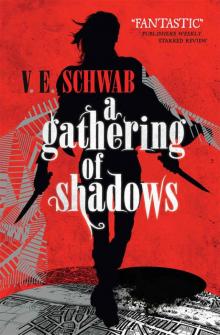 A Gathering of Shadows
A Gathering of Shadows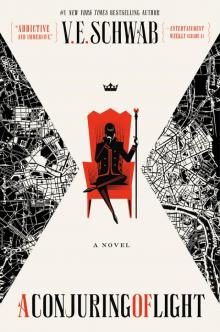 A Conjuring of Light
A Conjuring of Light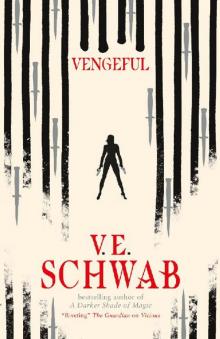 Vengeful
Vengeful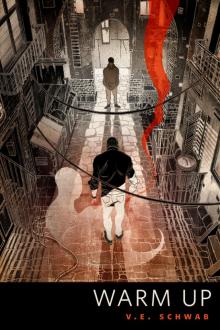 Warm Up
Warm Up The Near Witch
The Near Witch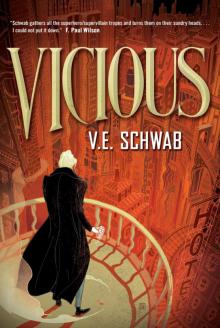 Vicious
Vicious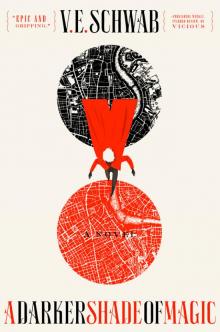 A Darker Shade of Magic
A Darker Shade of Magic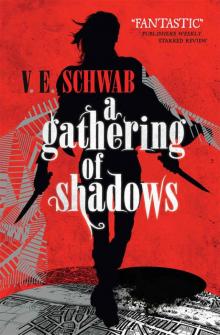 Gathering of Shadows (A Darker Shade of Magic)
Gathering of Shadows (A Darker Shade of Magic)